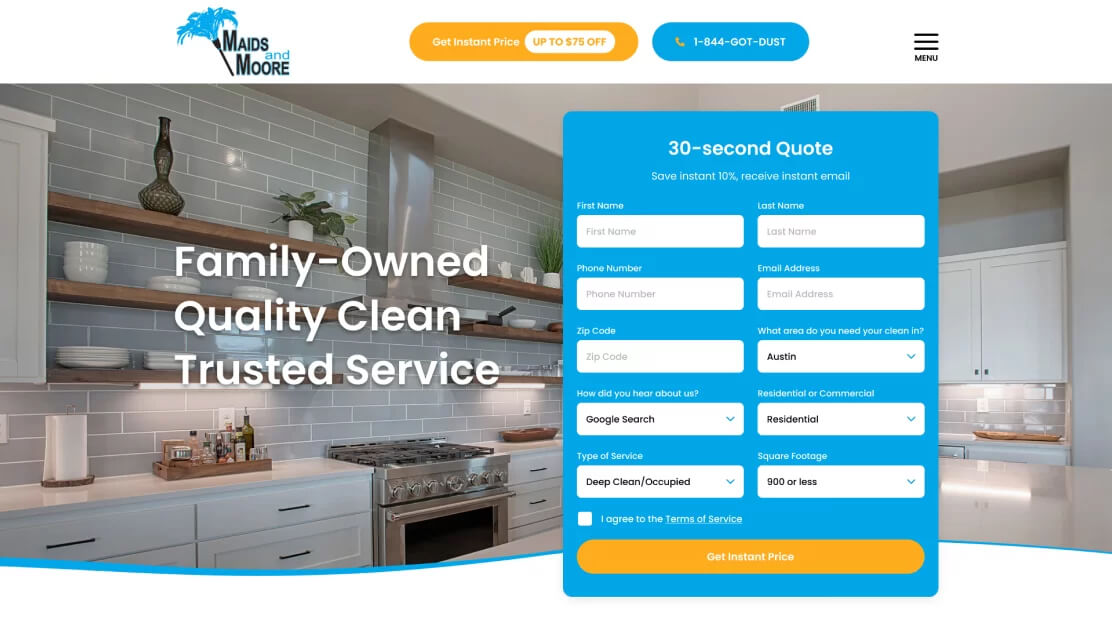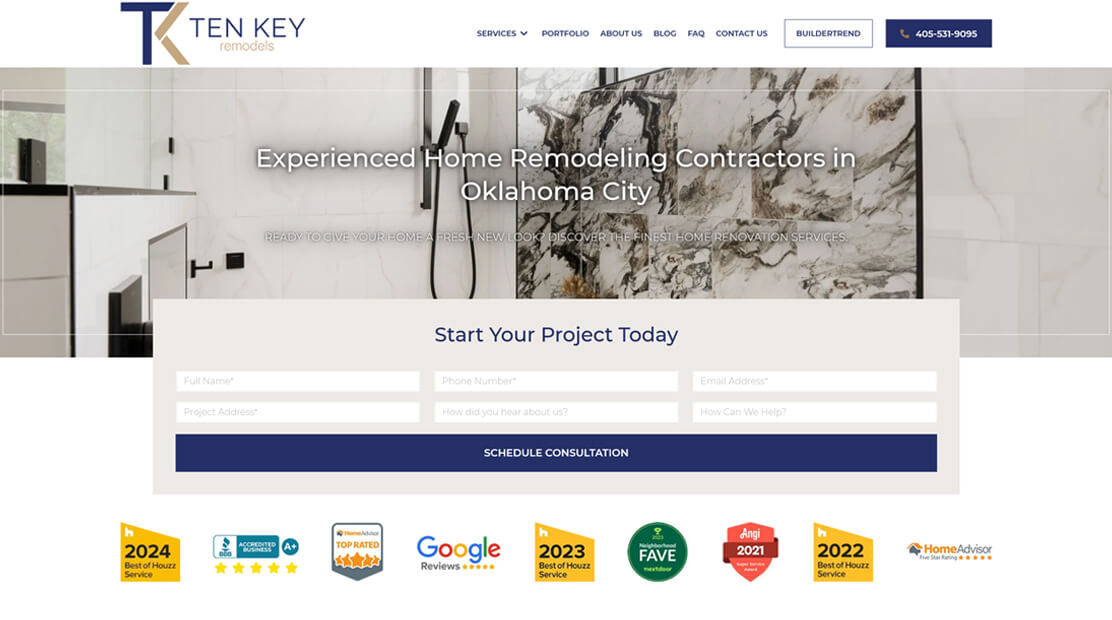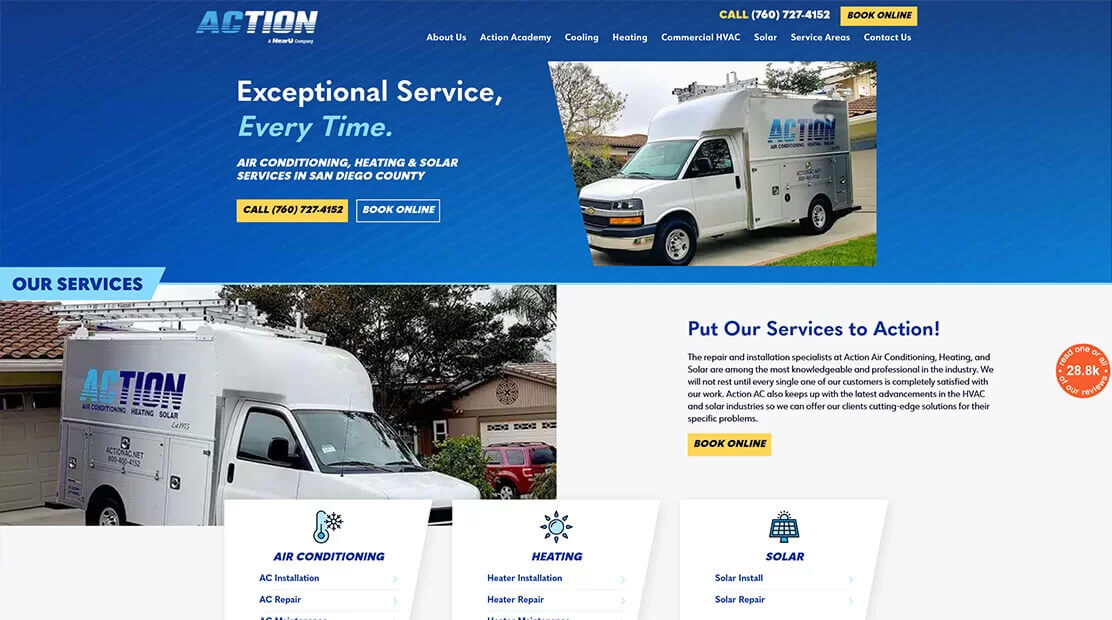Who even reads blogs in 2024? Apparently, almost everyone! Statistics reveal that a whopping 77% of internet users still regularly read blogs. Blogging is still a major force for SEO and it’s not going anywhere any time soon.
At the same time, 71% of marketers claim that content marketing, including blogging, has become even more important for their organizations in the last year. WordPress alone still powers more than 43% of online content, meaning that blogs make up almost half of all the sites out there. If you’re still hesitant about blogging for SEO in 2024, let’s put those doubts to rest. We’ll show you how blogs can give your site a serious visibility boost and help your business grow.

Is your website working for you? Find out with our free analysis!
Get free analysisWhy are blogs good for SEO?
From attracting organic traffic to building authority and fostering engagement, blogs still hold huge SEO power in 2024. Let’s dive deeper into all the reasons blogs are good for marketing these days.
1. Supercharging your social media strategy
Coming up with new and engaging content for social media every day can be exhausting and impractical. A lot of experienced social media pros tend to repurpose their posts and make the most of them. You can use your blog for social media marketing by turning it into attention-grabbing snippets, thought-provoking tweets, or eye-catching visuals. These bits are perfect for capturing your audience’s attention on platforms like Linkedin, X, or Instagram.
As you share the link to your post on social media, you can drive valuable traffic back to your website. As many as 92% of bloggers are driving traffic to their content via social media! Each post can serve as a dedicated landing page for your social media content and provide a deeper dive into the topics you mention on social platforms. Once they land on your blog, your visitors will likely continue browsing your website if they like what they see. This is an effective way to turn casual visitors into customers.
High-quality, engaging content also encourages organic sharing by your audience. This is your chance to position yourself as a true pundit in your field and extend your reach.
2. Building authority on Google
You have to be recognized as a trusted source by Google’s algorithm and blogs are still one of the most effective ways to do this. From smart interlinking to strategically placed keywords, blogs help SEO by strengthening your authority in Google’s eyes.
Every well-researched, informative post you publish acts as a testament to your expertise and gradually builds your online reputation. Over time, this consistent production of valuable content should solidify your position as a go-to expert in your niche. Google values this demonstration of knowledge, so it rewards websites that consistently provide value with higher search rankings.
If you want to become a trustworthy source in your niche, it’s advisable to focus on creating evergreen content. This is the type of content that stays relevant and informative for a long time, even years after you first publish it. This long-term value is very important for gaining credibility with both Google and your audience. With a little updating now and then, such a blog can keep attracting new readers and earning backlinks.
Most people want precise and informative answers on Google and this is exactly what you can provide. At the same time, fewer and fewer websites offer fact-checked and reliable information like this, as they erroneously rely on AI to produce tired, clichéd content. Therefore, publishing well-researched, quality pieces is an excellent way to stand out from the competition.
Well-written content will naturally encourage visitors to linger on your page longer and not give up on reading halfway. As many as 73% of people admit to skimming blog posts, while 27% read them to the end. They usually just get the information they need and leave. When you put effort into writing interesting content that your target audience will actually want to read, you’ll get more and more visitors spending more time on your website. More time on page indicates to Google that your website is relevant.
3. Regular site updates
Search engines like Google value fresh content. They’re constantly crawling the web and searching for new and updated information to deliver the most relevant results to their users. Websites that stay stagnant, with no new content added, can very easily fade into the background.
Regular updates signal to Google that you’re actively working on your site. Google’s algorhitm relies on more than 200 ranking factors and this is one of the most important ones. This is why an up-to-date website is the key to staying visible. And blog posts are a great way to make this happen.
It’s important to publish new content on a regular schedule, whether that’s weekly, bi-weekly, or monthly. Research indicates that 50% of bloggers tend to publish new content at least weekly or several times a month. As long as you stay consistent and put some effort into writing quality content, this strategy can help you convert.
If you’re out of ideas for brand new posts and thinking of other ways to use blogs for marketing, refreshing existing ones may be just as valuable. Actually, two thirds of bloggers regularly update old content! You can significantly improve user experience by revisiting and updating older posts with new information and insights. This keeps them relevant, which readers appreciate. At the same time, this shows Google that you’re actively maintaining and improving your website, which helps your rankings.
Don’t fall behind.
Harness the power of SEO
Get a Quote
4. Building quality backlinks
There’s a reason why 68% of SEOs use content as a way to build links. There’s a strong correlation between the number of backlinks a page has and its position in search results. The more high-quality links you have pointing to your site, the more Google sees you as a credible source. One way in which blogging helps SEO is by attracting these valuable backlinks.
When other content creators and publishers see your content as informative and relevant, they’re more likely to link back to it as a valuable resource. This can happen organically, as people naturally want to share interesting and relevant information they find. You can also proactively reach out to other websites and offer guest posts, which can include links back to your own site.
Keep in mind that not all backlinks are equal. Links from authoritative websites carry more weight with Google. The key is to get backlinks from reliable sources within your industry or niche. And this is more likely to happen if your posts are also high in quality.
5. Ranking in the top spots
Many enrtrepreneurs wonder if blogs are good for marketing their business. If you consider that most users never go beyond the first Google search results page, you’ll see why well-optimized content is the key to better sales. Websites on the first page get as much as 91.5% of traffic, so rankings can truly make or break your business.
Keyword research plays a very important role here. If you use the right keywords strategically in your blog, it’ll be more likely to appear in the top search results. Experienced SEO professionals usually aim for a balance between popular, high-volume keywords and longer, more specific long-tail keywords. According to research, long-tail keywords make up the majority of Google searches. These niche phrases often reflect a user’s specific intent, so they can potentially lead to higher-quality traffic and more conversions.
Remember that Google’s algorithm is constantly evolving and user search behavior can change over time. You have to reassess your keyword strategy regularly and keep monitoring the success of posts. Generally, SEO blogs that make good use of relevant keywords tend to perform better. With some patience and consistency, the rankings and leads will follow.
6. Getting more traffic & conversions
Blogging is still the most sustainable and cost-effective way to drive organic traffic. This is how blogs can help your marketing in a big way. While paid advertising and email campaigns have their role in a well-rounded digital marketing strategy, why not also take advantage of what’s up for grabs for free? 70% of Internet users prefer getting information from blog posts than from traditional ads. Google users looking for information may read your post, reliaze you’re a reliable expert, and decide to buy from you even if that wasn’t their original intention.
If you target the right keywords, you’re likely to attract visitors who are actively searching for information related to your services or products. This targeted traffic is more likely to convert into leads and customers because they’ve already demonstrated an interest in what you have to offer.
Each blog presents is a chance to capture new leads directly. If you incorporate clear and compelling calls to action within your posts, you can encourage readers to take the next step. If these CTAs are button-shaped, you can benefit from a significant 45% increase in clicks. Whether it’s requesting a free quote, scheduling a consultation, or booking an appointment, these CTAs prompt readers to engage further with your business and move closer to a purchase decision.
Keep in mind that conversions are a process, not an instant event. Only some of your readers will become leads and it may take time for your blogs to gain traction. While this may tempt you to start churning out content using AI, but are AI blogs actually good for SEO? The answer is a resounding no, as this can actually hurt your website. Only 3% of content writers write whole posts using AI, and for good reason.
As of Google’s update in March 2024, websites featuring AI-generated content have been penalized. The verdict is in: AI content doesn’t meet Google’s strict quality standards. AI content is often too generic, repetitive, and poorly written, which reads easily see through and click out. This also means losing relevance in Google’s eyes and missing out on potential customers.
Where can I outsource blogging for SEO?
Partner with One Click Marketing, your trusted digital marketing agency that delivers measurable results! With more than 13 years of experience, a commitment to transparency and integrity and a strong track record of success, we’re a safe and reliable choice for your business growth. More than 200 satisfied clients have been relying on our comprehensive and effective SEO services for years.
We’ve helped our valued clients reach an average revenue growth of 40%, which makes them choose us again and again. Our experienced in-house content team will create a perfect blogging strategy for your business. We’ll work with you every step of the way to create a relevant and well-written SEO blog that will attract visitors, build authority, and drive more conversions. Don’t let your website fade into the background. Contact us today to learn what we can do for you!









